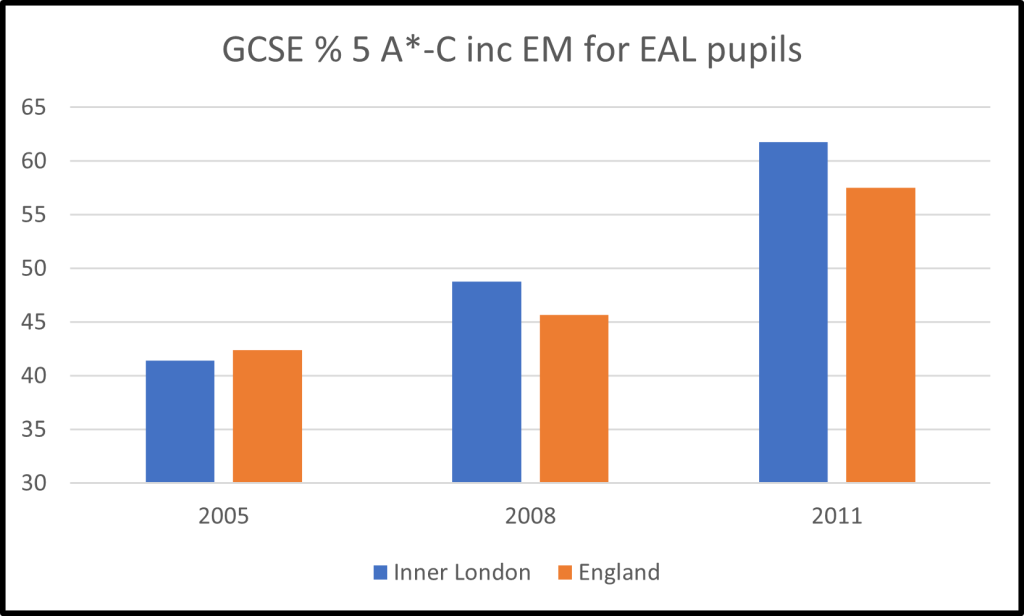
Leading EAL provision in a school can be a challenging and sometimes lonely job. In order to make a real impact for your EAL pupils, first you may need to focus on persuading your colleagues and senior leaders to take time to understand your school’s EAL profile and adapt their practices appropriately. When everyone is time poor this is no easy task. You need an attention-grabbing tool. Don’t be intimidated – reach for the data!
What EAL data did next
Part 1 of this blog ended with my appointment to the first job I had seen advertised for a local authority EAL advisor, requiring data management and analysis skills. I did the job very happily for eighteen months until my boss told me that I should apply for a Head of EAL job in a secondary school. And she told me the day after the deadline for applications had expired, which suggested that maybe this was a job with my name on it. It was a big school, but not a very good one. Ofsted (the Office for Standards in Education, Children’s Services and Skills) had just been founded and I recognised that the school was probably walking into special measures (it did, but has been outstanding for the last 20 years).
What EAL data did for a school
A new headteacher started the same day as me, so there would be lots of possibilities. She was a headteacher who understood the power of data in an institution unfamiliar with it. Within three months the school foyer was decorated with graphs and a map which proclaimed proudly the multilingual nature of the school. Best of all the new head brought in a new system for departmental funding. You had to bid for it and show how using it would improve the school. My bids had lots of graphs in them. I managed to secure a new computer and the installation of the school’s internet connection to go with it. By the time I left, only the science department had a bigger budget. More importantly, I had the tools to show the staff:
- what kinds of EAL learner they had
- what languages they spoke
- what would develop their classroom English most quickly.
What EAL data did for a city
After that I worked in two other Local Authorities (LAs) where the Directors of Education valued data. I ended up in front of London Challenge team (a school improvement programme launched by the UK government designed to create a “step change” in the performance of London secondary schools), sharing what the data told us about EAL issues in London and what we could do about it. That led to lots of London-wide work for my team of LA consultants and eventually to the lead role in the Pan London EAL Strategy, the outcomes of which you can see in this graph.

What EAL data did for me
When austerity brought London Challenge and many local authority EAL teams to an end, I set up the EAL Academy and continued to use data with our clients. Learning how to capture, analyse and present data in a powerful way provided me with valuable skills to develop my career in the direction I wanted.
What EAL data can do for you
Through Freedom of Information analysis of published data and successful Freedom of Information requests I have been able to provide a range of EAL data for UK schools in the downloads section of our website. Do have a look if you are interested in:
- Key Stage 2 outcomes by local authority for EAL pupils
- GCSE outcomes by local authority for EAL pupils
- EAL funding by local authority
- Languages spoken by pupils in each local authority
- Ethnicity (including fine codes such as Somali) by local authority
- Community language GCSE data.
If you’re struggling to find the data for your school, get in touch contact@theealacademy.co.uk and we can help.
Take a look at the latest data on English state schools
Read our analysis of the latest data.

EAL data: finding it and using it
Online course
To bolster your data skills, consider this short online course. The course aims to develop data analysis and presentation skills in relation to EAL learners. It covers both what we can learn from school and wider data sources and how we can present that data to influence colleagues and improve EAL provision.
The EAL Quality Mark is based on a school’s self-evaluation of its EAL provision. It is an award made to schools on their achievements in meeting the needs of pupils learning English as an additional language.
It is available as a bronze, silver or gold award, allowing schools the opportunity to re-visit the award and build on their practice over time. Any school with pupils on roll who are learning English as an additional language is eligible to apply.
